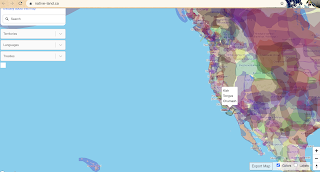Ahh, Thanksgiving. It's a holiday that's sat uncomfortably with me for the past few years, especially as I've learned more about colonialism and the mistreatment and murder of Native people as generations of white people took their land and made it "ours." (Part of that was the research for the chapter on We'wha in my upcoming book, NO WAY, THEY WERE GAY? Hidden Lives and Secret Loves.)
So for a long time I've tried to shift my focus onto the gratitude part of the holiday.
But this year, I was inspired by my friends April and Lori to do a little more. I've lived in Los Angeles since 1991 (twenty-nine years now!) but in all that time, I've never really dug into the history of who lived here before. Before the white people. Before the Spanish.
It took me two Google searches to find a website created by the Gabrielino-Tongva Nation.
The first search took me to a website on the history of my neighborhood that had this line about the Gabrielina-Tongva people who lived here, "Eventually, they shared the land and sea—the good duck hunting and steel-head trout fishing—with the Spanish explorers and, in time, with the first Angelenos.” which sounds like a page out of the happy Pilgrims holding hands with Native people singing campfire songs "history" I learned in school.That's where I learned that:
The Gabrielino-Tongva Nation has been indigenous to the Los Angeles Basin for 7,000 years. This history is well-documented through 2,800 archaeological sites, in State historical records and federal archives, and Catholic church records at San Gabriel Mission and San Fernando Mission.
Their struggle for official recognition:
In 1994, the State of California recognized the Tongva in Assembly Joint Resolution 96, chaptered by the California Secretary of State as Resolution chapter 146, Statutes of 1994. The Joint Resolution states that the State of California “recognizes the Gabrielino-Tongva Nation as the aboriginal tribe of the Los Angeles Basin and takes great pride in recognizing the Indian inhabitance of the Los Angeles Basin and the continued existence of the Indian community”.
And that they still do not have federal recognition:
The Gabrielino-Tongva are one of two state-recognized tribes and the best-documented tribe in the State without federal recognition.I recognize this is a small step, but it feels important to acknowledge that I live on the ancestral lands of the Gabrielino-Tongva Nation.
Lee
960.jpg)

















No comments:
Post a Comment